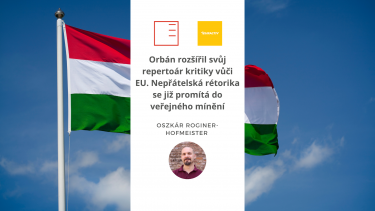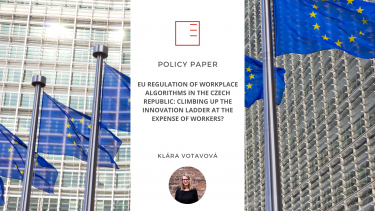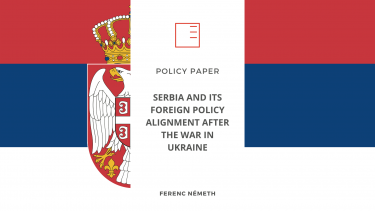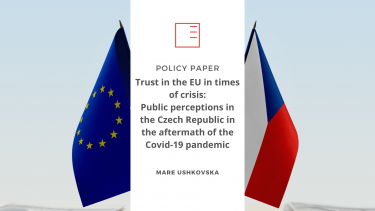INVITATION | Café Evropa online: Petr Pavel & Věra Jourová & Vitalij Usatyj: One year after the Russian attack on Ukraine
We would like to invite you to an online debate as part of the Café Evropa series, this time on the topic "Petr Pavel & Věra Jourová & Vitalij Usatyj: One year after the Russian attack on Ukraine" The debate will take place on Friday 24 February at 14:00 online on our Facebook page.
Show morePOLICY PAPER | The lingering war in Ukraine: Security implications in Europe
Orsolya Ráczová writes that it is difficult to predict the long-term effects of war with certainty, yet it is essential to be aware of the fact that the longer a war continues, the more dire its long-term impact becomes. The era of relative peace and stability in Europe is over, security should no longer be taken for granted. Europe needs to rethink its security at EU, NATO and Member State level. It is also essential to strike the right balance to ensure security at home while providing much-needed support to Ukraine.
Show moreEuractiv: Orbán expanded his repertoire of criticism of the EU. The hostile rhetoric is already being reflected in public opinion
About what kind of policy is Victor Orbán leadinng towards European Union and his upcoming annual speach, wrote for Euractiv Oszkár Roginer, Global EU project manager from the EUROPEUM Institute.
Show more
POLICY PAPER | Shifting the gender quota debate from underrepresentation of women to overrepresentation of men within diplomacy
Ivana Uličná writes about the fact that even though some progress has been made towards gender equality in diplomacy, women remain underrepresented in ambassadorial positions worldwide. Quotas have been effective in boosting nominal representation of women but critiques focused on quotas being tokenistic and harming meritocracy place a double burden on women. However, even the current system is not meritocratic, as men benefit from a historical advantage and assumed competence, while women must justify their presence, prove their worth and disprove gender stereotypes.
Show moreBLOG | European Media Freedom Act on the case of Slovenia: Has Slovenia overtaken the European Commission with its new law?
In September 2022, the European Commission put forward a proposal for a new media regulator - the European Media Freedom Act. Slovenia is one of the most struggling EU countries in terms of media freedom and independence. In the summer of 2020, the Janša government proposed a media-focused law that would increase the state's influence over Slovenia's national press agency and limit its funding of the public broadcaster RTV. Has Slovenia's new law put the European Commission ahead of the game? That is what our intern Klára Landová discusses in her blog.
Show moreSUMMARY OF EXPERIENCES WITH THE INVOLVEMENT OF CSOS IN V4 IN THE DECARBONISATION PROCESS
The project is focused on the examination of the role of non-governmental organizations in the process of decarbonization of coal regions in V4 countries (Czech Republic, Hungary, Poland, Slovakia). The aim of the project is to describe the best and worst practices of the individual processes for Serbia, who awaits the transformation of its energy mix, largely based on coal. The examined V4 countries have had a slightly different share of coal in their energy mix, while the largest one being in Poland and the second largest one in the Czech Republic, followed by Hungary and Slovakia. There are many similarities and differences in their takes on decarbonisation, thus providing different range of experiences.
Show more PDF

Policy Paper | EU Regulation of Workplace Algorithms in the Czech Republic: Climbing up the Innovation Ladder at the Expense of Workers?
Our researcher Klára Votavová has written a policy paper in which she discusses the new dilemmas concerning the balance of competitiveness and decent work standards in the Czech Republic, which are emerging with advancing digitalization and automation.
Show more PDFPolicy Paper | Serbia and Its Foreign Policy Alignment after the War in Ukraine
Ferenc Németh, a researcher on the politics, security and integration of the Western Balkans, has written a policy paper under the project Think Visegrad in Brussels. In it he examines Serbia's foreign policy towards the European Union after the Russian invasion of Ukraine.
Show more PDFPolicy Paper | Trust in the EU in times of crisis: Public perceptions in the Czech Republic in the aftermath of the Covid-19 pandemic
How has the Covid-19 pandemic affected the Czechs' relationship with the European Union? This topic is addressed in a policy paper by visiting fellow Mare Ushkovska.
Show moreBLOG | “A Close Neighbor Is Better Than a Distant Relative” - Belt and Road Initiative: Are We Closer After 10 Years?
In 2013, the Chinese president introduced the New Silk Road project, also known as the Belt and Road Initiative. It was to connect China with countries in Central Asia, the Middle East, Europe and maritime regions with the purpose to coordinate policies and link infrastructure. However, the initiative, and especially China's role in it, raises many questions and doubts. What is its future? This is what our intern Šárka Váchalová discusses in her blog.
Show moreStaroměstské náměstí 4/1
Prague 1 - Staré Město
110 00
tel.: +420 212 246 552
email: europeum@europeum.org
https://www.europeum.org









